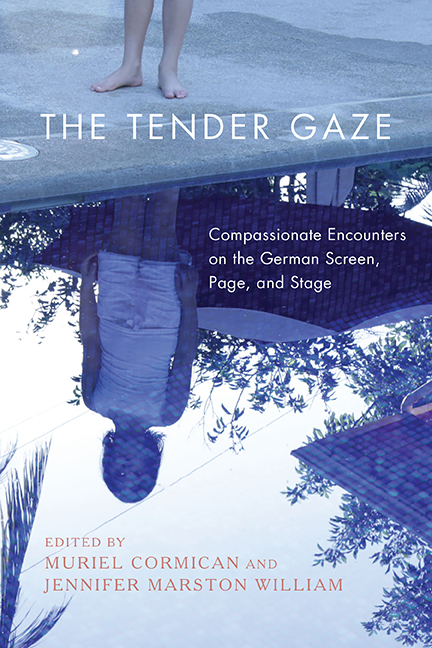Book contents
- Frontmatter
- Contents
- Acknowledgments
- Introduction: The Tender Gaze
- 1 Toward a Theory of the Tender Gaze: Affect, Critical Insight, and Empathy in Contemporary German Cinema
- 2 The Tender Gaze, Embodied Politics, and Perspective-Taking in German Postdramatic Theater
- 3 Face to Face: Race, Gender, and the Gaze in Mo Asumang’s Die Arier
- 4 “Risse, hinter denen man einen Kern entdeckt, der so ähnlich ist wie die Herzen von uns allen”: The Tender Gaze in Umut Dağ’s Risse im Beton
- 5 Looking through the Eyes of Empathy: Encouraging a Culture of Caring and Compassion in Doris Dörrie’s Keiner liebt mich
- 6 The Tender and Transgressive Beast Within: Escape Narratives in Films by Krebitz, Stuber, and Speckenbach
- 7 Looking at Looking in Margarethe von Trotta’s Das Versprechen
- 8 A Queer Phenomenology of Gender in Maren Ade’s Alle Anderen and Toni Erdmann
- 9 Rilke’s “Schauen”
- 10 Pity Stares or Tender Gaze? Seeing Disability in Nineteenth-Century Austrian and German Literature
- 11 The Sociohistorical and Gendered Implications of Gazing Tenderly in Ludwig Tieck’s “Liebeszauber”
- 12 Mothering, Animals, and the Surveillance State in the Anthropocene: An Ecofeminist Reading of Birgit Vanderbeke’s Die Frau mit dem Hund
- Notes on the Contributors
- Index
2 - The Tender Gaze, Embodied Politics, and Perspective-Taking in German Postdramatic Theater
Published online by Cambridge University Press: 05 October 2022
- Frontmatter
- Contents
- Acknowledgments
- Introduction: The Tender Gaze
- 1 Toward a Theory of the Tender Gaze: Affect, Critical Insight, and Empathy in Contemporary German Cinema
- 2 The Tender Gaze, Embodied Politics, and Perspective-Taking in German Postdramatic Theater
- 3 Face to Face: Race, Gender, and the Gaze in Mo Asumang’s Die Arier
- 4 “Risse, hinter denen man einen Kern entdeckt, der so ähnlich ist wie die Herzen von uns allen”: The Tender Gaze in Umut Dağ’s Risse im Beton
- 5 Looking through the Eyes of Empathy: Encouraging a Culture of Caring and Compassion in Doris Dörrie’s Keiner liebt mich
- 6 The Tender and Transgressive Beast Within: Escape Narratives in Films by Krebitz, Stuber, and Speckenbach
- 7 Looking at Looking in Margarethe von Trotta’s Das Versprechen
- 8 A Queer Phenomenology of Gender in Maren Ade’s Alle Anderen and Toni Erdmann
- 9 Rilke’s “Schauen”
- 10 Pity Stares or Tender Gaze? Seeing Disability in Nineteenth-Century Austrian and German Literature
- 11 The Sociohistorical and Gendered Implications of Gazing Tenderly in Ludwig Tieck’s “Liebeszauber”
- 12 Mothering, Animals, and the Surveillance State in the Anthropocene: An Ecofeminist Reading of Birgit Vanderbeke’s Die Frau mit dem Hund
- Notes on the Contributors
- Index
Summary
IN THIS ESSAY I CONSIDER how political urgency can be embodied within the theater space during postdramatic performances, and how the resulting experience encourages audience members’ perspective-taking and the tender gaze in a way that may also spark prosocial action beyond the theater walls. I expand the concept of the tender gaze slightly from the way it is most commonly considered in this volume, as a literal gaze occurring when characters look at each other in an altruistic, humanizing, and compassionate manner, or as a narrative perspective taken by a text's narrator or by a film's camera to convey similar non-voyeuristic, non-sexist, and non-racist stances. In the case of live theater productions, the more literal type of tender gaze mentioned above can also happen between people on stage (perhaps while they are in character) as well as between audience members and performers during the show. More figurative tender gazes can arise as well from people occupying the theater's seats and from the people on the stage, all of whom work together during a defined time span to co-create meaning and to embody a political urgency or impulse. This may not involve a direct gaze at all but is more of a “mind's eye” gaze that can be cast upon historical and contemporary figures or groups that are represented or alluded to during the performance. The basic tenets of the compassionate and ethical tender gaze as theorized in this volume's introduction and in Muriel Cormican's foundational essay still hold true in these cases. A “mind's eye” type of tender gaze can also ensue from watching a film or reading a text. In live performance, audience members can influence each other's perceptual experience—and this can also happen when films are viewed or texts are read aloud in public settings—and thus the same show may come across quite differently with each separate performance, depending on exactly what happens within the physical space each time. The following is an outline of the way certain techniques employed in postdramatic theater styles invite perspective-taking and thus offer a receptive experience for the audience that oscillates between an affective and cognitive focus of attention.
- Type
- Chapter
- Information
- The Tender GazeCompassionate Encounters on the German Screen, Page, and Stage, pp. 40 - 59Publisher: Boydell & BrewerPrint publication year: 2021



